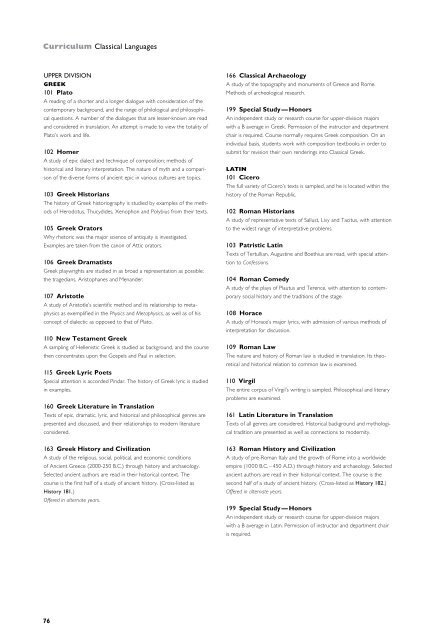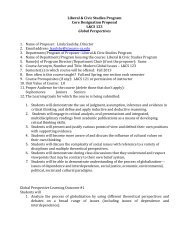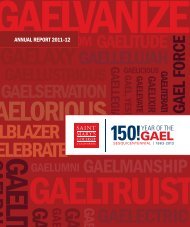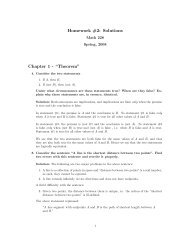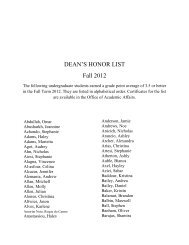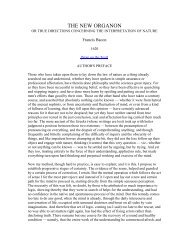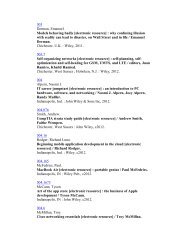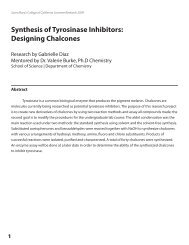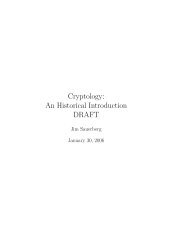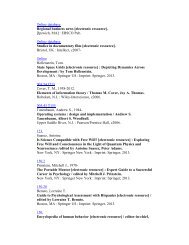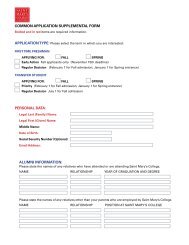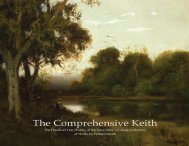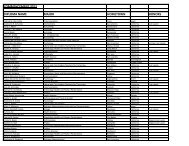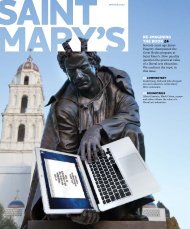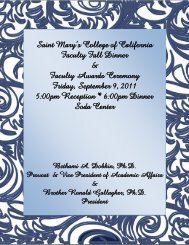2008-09 Catalog - Saint Mary's College of California
2008-09 Catalog - Saint Mary's College of California
2008-09 Catalog - Saint Mary's College of California
You also want an ePaper? Increase the reach of your titles
YUMPU automatically turns print PDFs into web optimized ePapers that Google loves.
Curriculum Classical LanguagesUpper DivisionGreek101 PlatoA reading <strong>of</strong> a shorter and a longer dialogue with consideration <strong>of</strong> thecontemporary background, and the range <strong>of</strong> philological and philosophicalquestions. A number <strong>of</strong> the dialogues that are lesser-known are readand considered in translation. An attempt is made to view the totality <strong>of</strong>Plato’s work and life.102 HomerA study <strong>of</strong> epic dialect and technique <strong>of</strong> composition; methods <strong>of</strong>historical and literary interpretation. The nature <strong>of</strong> myth and a comparison<strong>of</strong> the diverse forms <strong>of</strong> ancient epic in various cultures are topics.103 Greek HistoriansThe history <strong>of</strong> Greek historiography is studied by examples <strong>of</strong> the methods<strong>of</strong> Herodotus, Thucydides, Xenophon and Polybius from their texts.105 Greek OratorsWhy rhetoric was the major science <strong>of</strong> antiquity is investigated.Examples are taken from the canon <strong>of</strong> Attic orators.106 Greek DramatistsGreek playwrights are studied in as broad a representation as possible:the tragedians, Aristophanes and Menander.107 AristotleA study <strong>of</strong> Aristotle’s scientific method and its relationship to metaphysicsas exemplified in the Physics and Metaphysics, as well as <strong>of</strong> hisconcept <strong>of</strong> dialectic as opposed to that <strong>of</strong> Plato.110 New Testament GreekA sampling <strong>of</strong> Hellenistic Greek is studied as background, and the coursethen concentrates upon the Gospels and Paul in selection.115 Greek Lyric PoetsSpecial attention is accorded Pindar. The history <strong>of</strong> Greek lyric is studiedin examples.160 Greek Literature in TranslationTexts <strong>of</strong> epic, dramatic, lyric, and historical and philosophical genres arepresented and discussed, and their relationships to modern literatureconsidered.163 Greek History and CivilizationA study <strong>of</strong> the religious, social, political, and economic conditions<strong>of</strong> Ancient Greece (2000-250 B.C.) through history and archaeology.Selected ancient authors are read in their historical context. Thecourse is the first half <strong>of</strong> a study <strong>of</strong> ancient history. (Cross-listed asHistory 181.)Offered in alternate years.166 Classical ArchaeologyA study <strong>of</strong> the topography and monuments <strong>of</strong> Greece and Rome.Methods <strong>of</strong> archeological research.199 Special Study — HonorsAn independent study or research course for upper-division majorswith a B average in Greek. Permission <strong>of</strong> the instructor and departmentchair is required. Course normally requires Greek composition. On anindividual basis, students work with composition textbooks in order tosubmit for revision their own renderings into Classical Greek.Latin101 CiceroThe full variety <strong>of</strong> Cicero’s texts is sampled, and he is located within thehistory <strong>of</strong> the Roman Republic.102 Roman HistoriansA study <strong>of</strong> representative texts <strong>of</strong> Sallust, Livy and Tacitus, with attentionto the widest range <strong>of</strong> interpretative problems.103 Patristic LatinTexts <strong>of</strong> Tertullian, Augustine and Boethius are read, with special attentionto Confessions.104 Roman ComedyA study <strong>of</strong> the plays <strong>of</strong> Plautus and Terence, with attention to contemporarysocial history and the traditions <strong>of</strong> the stage.108 HoraceA study <strong>of</strong> Horace’s major lyrics, with admission <strong>of</strong> various methods <strong>of</strong>interpretation for discussion.1<strong>09</strong> Roman LawThe nature and history <strong>of</strong> Roman law is studied in translation. Its theoreticaland historical relation to common law is examined.110 VirgilThe entire corpus <strong>of</strong> Virgil’s writing is sampled. Philosophical and literaryproblems are examined.161 Latin Literature in TranslationTexts <strong>of</strong> all genres are considered. Historical background and mythologicaltradition are presented as well as connections to modernity.163 Roman History and CivilizationA study <strong>of</strong> pre-Roman Italy and the growth <strong>of</strong> Rome into a worldwideempire (1000 B.C. – 450 A.D.) through history and archaeology. Selectedancient authors are read in their historical context. The course is thesecond half <strong>of</strong> a study <strong>of</strong> ancient history. (Cross-listed as History 182.)Offered in alternate years.199 Special Study — HonorsAn independent study or research course for upper-division majorswith a B average in Latin. Permission <strong>of</strong> instructor and department chairis required.76


